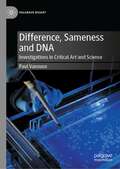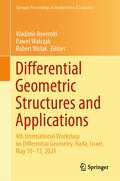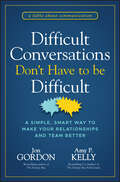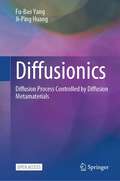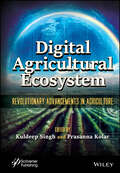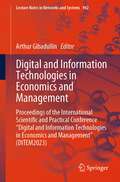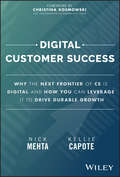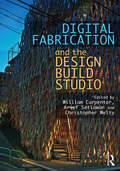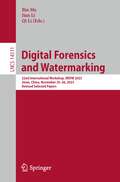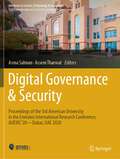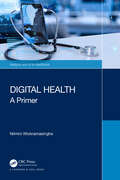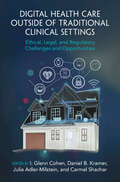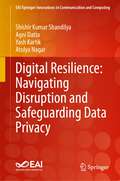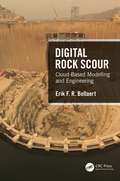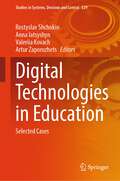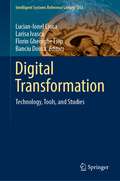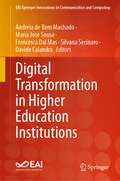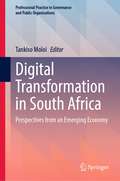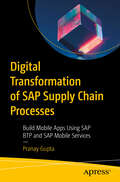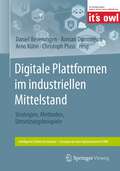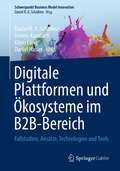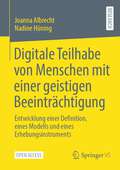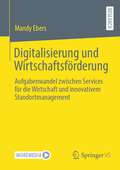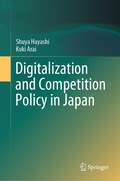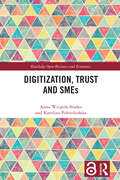- Table View
- List View
Difference, Sameness and DNA: Investigations in Critical Art and Science (Palgrave BioArt)
by Paul VanouseThis book chronicles over two decades of critical, artistic investigations by Paul Vanouse. His bio-media artwork utilizes the tools of the life sciences reflexively, to challenge tropes and cultural politics surrounding DNA, biotechnology, and life itself. DNA has been called a “Truth Machine”, “God’s Blueprint”, the “Code of Codes” and the “Book of Life”. Vanouse’s work explores questions at the heart of such evocative metaphor and hyperbole: how does DNA link us together, how does it differentiate us and how are the grand metaphors, which grant DNA complete centrality, misconstruing the complexity of life. Furthermore, how do technologies of genetic typing and identification fit within a broader cultural and political history of difference making, particularly the construction of race. Melding critical theory, artist’s manifesto, participatory observation and histories of the sciences, this book offers insight into both an artistic practice and the bio-techno-sciences it interrogates.
Differential Geometric Structures and Applications: 4th International Workshop on Differential Geometry, Haifa, Israel, May 10–13, 2023 (Springer Proceedings in Mathematics & Statistics #440)
by Vladimir Rovenski Paweł Walczak Robert WolakThis proceedings contains a collection of selected, peer-reviewed contributions from the 4th International Workshop "Differential Geometric Structures and Applications" held in Haifa, Israel from May 10–13, 2023. The papers included in this volume showcase the latest advancements in modern geometry and interdisciplinary applications in fields ranging from mathematical physics to biology.Since 2008, this workshop series has provided a platform for researchers in pure and applied mathematics, including students, to engage in discussions and explore the frontiers of modern geometry. Previous workshops in the series have focused on topics such as "Reconstruction of Geometrical Objects Using Symbolic Computations" (2008), "Geometry and Symbolic Computations" (2013), and "Geometric Structures and Interdisciplinary Applications" (2018).
Difficult Conversations Don't Have to Be Difficult: A Simple, Smart Way to Make Your Relationships and Team Better (Jon Gordon)
by Jon Gordon Amy P. KellyHelp your team maximize their full potential by mastering tough conversations In Difficult Conversations Don’t Have to be Difficult: A Simple, Smart Way to Make Your Relationships and Team Better, bestselling author Jon Gordon and veteran human resources professional and executive coach Amy P. Kelly deliver an engaging and inspiring new take on how to make tough workplace conversations an asset in building a stronger team and organization. The book, written as a business fable, follows Ruth, the CEO of a successful multinational company who has been instructed by her board to prepare her company for sale. Along the way, she must lead an underperforming and dysfunctional team to set aside their differences and work together toward a common goal. This includes growing herself while elevating her team’s performance. As Ruth discovers the secret to unlocking extraordinary growth and productivity, you’ll learn about: The critically important conversations you need to have with your team to realize outstanding results Structuring, planning, and having the tough conversations your team members really need Ensuring your team walks away from difficult conversations more united, motivated, inspired, and positioned for optimal growth and performance Perfect for managers, executives, directors, and business leaders and their teams, Difficult Conversations Don’t Have to be Difficult is also a must-read for coaches, trainers, teachers, consultants, and other professionals doing their best to help others realize their full potential. Teams who read the book together will be equipped with a proven strategy and process to enhance communication performance and unity.
Diffusionics: Diffusion Process Controlled by Diffusion Metamaterials
by Fu-Bao Yang Ji-Ping HuangThis open access book presents a comprehensive exploration of diffusion metamaterials that control energy and mass diffusion. Currently, if from the perspective of governing equations, diffusion metamaterials and wave metamaterials (pioneered by J. B. Pendry in the 1990s) are recognised as the two most prominent branches in the field of metamaterials. These two branches differ in their emphasis on the diffusion equation (as the governing equation) and time-dependent characteristic lengths in diffusion metamaterials, as opposed to the wave equation (as the governing equation) and time-independent characteristic lengths in wave metamaterials. Organized into three distinct parts – 'Thermal Diffusion Metamaterials', 'Particle Diffusion Metamaterials', and 'Plasma Diffusion Metamaterials' – this book offers a rigorous exploration spanning physics, engineering, and materials science, aimed at advancing our understanding of diffusion processes controlled by diffusion metamaterials. Incorporating foundational theory, computational simulations, and laboratory experiments, the book equips researchers and scholars across these disciplines with comprehensive methods, insights, and results pivotal to the advancement of diffusion control. Beyond facilitating interdisciplinary discourse, the book serves as a catalyst for innovative breakthroughs at the crossroads of physics, thermodynamics, and materials science. Essentially, readers will acquire profound insights that empower them to spearhead advancements in diffusion science (diffusionics) and the engineering of metamaterials.
Digital Agricultural Ecosystem: Revolutionary Advancements in Agriculture
by Kuldeep Singh Prasanna KolarDigital Agricultural Ecosystem The book comprehensively explores the dynamic synergy between modern technology and agriculture, showcasing how advancements such as artificial intelligence, data analytics, and smart farming practices are reshaping the landscape to ensure food security in the era of climate change, as well as bridging the gap between cutting-edge research and practical implementation. Agriculture has historically been the foundation of human civilization and benefits communities all around the world. Agriculture has a creative, adaptable, and innovative history, and as the digital age draws closer, agriculture is once again poised for change. Each of the 20 chapters explores the connection between agricultural and technological advancements, and are divided into four key areas. Part 1 covers knowledge sharing in the digital agricultural ecosystem. In the context of modern agriculture, the chapters underscore the importance of information flow. Through comprehensive reviews of literature and assessments of farmer participation on social media platforms, these chapters illustrate the value of information sharing for sustainable agriculture. Part 2 explores the adoption and impact of digital technologies in agriculture. The use of cutting-edge digital technologies in agriculture is examined thoroughly in this section. The chapters included here outline how precision, artificial intelligence, and blockchain technology have the potential to transform methods of agriculture and improve food systems. Part 3 addresses smart farming and sustainable agriculture. This section focuses on sustainability and offers details on eco-friendly production methods, the significance of smart farming in many nations, including India and the UK, and cost-effective fertilizer sprayer technologies. Part 4 examines the modeling and analysis of agricultural systems. This last section explores how mathematical modeling and data analytics are used in agricultural systems, with insights on everything from the study of credit access constraints in rural regions to water resource management in irrigation systems. Audience The diverse readership includes farmers, agronomists, agricultural researchers, policymakers, environmentalists, information technologists, and students from academic and professional fields who are eager to learn more about how digital innovation and sustainable agriculture can be used to address global issues such as climate change, food security, and smart farming.
Digital and Information Technologies in Economics and Management: Proceedings of the International Scientific and Practical Conference "Digital and Information Technologies in Economics and Management" (DITEM2023) (Lecture Notes in Networks and Systems #942)
by Arthur GibadullinThis book covers the III International Scientific and Practical Conference "Digital and Information Technologies in Economics and Management" (DITEM2023) which was held on November 21–23, 2023. The conference addressed issues of networks and systems related to the use of information technologies in economics and management of various sectors. A distinctive feature of the conference is that it featured presentations by authors from China, Bulgaria, Uzbekistan, Oman, Kazakhstan and Russia. Researchers from different countries presented the process of transition to new information technologies of various network and system structures and sectors. The conference made it possible to develop new scientific recommendations on the use of information, computer, digital and intellectual technologies and networks in industry and fields of activity that can be useful to state and regional authorities, international and supranational organizations, the scientific and professional community.
Digital Customer Success: Why the Next Frontier of CS is Digital and How You Can Leverage it to Drive Durable Growth
by Nick Mehta Kellie CapoteAutomate your Customer Success efforts to reduce churn and increase profits In Digital Customer Success: The Next Frontier, a team of trailblazing Customer Success professionals and digital entrepreneurs delivers an insightful discussion of the next stage in Customer Success management. In the book, you'll discover how to design and deploy touchless and automated digital interventions that help your software users learn and grow as they use your product and unlock the value trapped within it — without ever needing to reach out to a live Customer Success Manager. The authors provide a detailed “How-To” guide to Digital Customer Success that explains how you can meet the needs of your customers, investors, and team members. You'll explore the basics of the authors' original Digital Customer Success Maturity Model and the core tenets of how to get started. After that, you'll find: Explanations of the ideal organizational structures to enable Digital Customer Success management Case studies and examples from real companies blazing new trails in Customer Success Critical success measurements and metrics you can use to determine if your company is on the right track or if it needs to reorient Perfect for managers, executives, directors, founders, entrepreneurs, and other business leaders involved in the sale of digital and software products, Digital Customer Success is also a can't-miss resource for Customer Success professionals, sales leaders, marketers, product development professionals, and anyone else with a stake in reducing customer churn and increasing revenues.
Digital Fabrication and the Design Build Studio
by William Carpenter Arief Setiawan Christopher WeltyThis book explores the connection between digital fabrication and the design build studio in both academic and professional studios.The book presents 17 essays and cases studies from well-known scholars and practitioners, including Kengo Kuma, Joseph Choma, Dan Rockhill, Keith Zawistowski, and Marie Zawistowski, whose theoretical and practical work addresses design build at various levels. Four introductory essays trace the history of the design build movement, exploring the emergence of design build in the pedagogy of the Bauhaus, the integration of technology into architectural design, and the influence of the act of making on the design build studio. The rest of the book is divided into two parts; the first part looks at traditional pedagogical models for the design build studio, and the second part focuses on experimental methods used in design build programs. Together, these works discuss human behavior, social-cultural trends, and motivations in socially minded studios which are based on a service-learning model. They look at component-based studios where innovation allows for an increased level of research and testing of new materials and assemblies, sustainable principles, and zero-energy prototypes.Illustrated with over 200 color images, this book will be a valuable resource for architecture students, educators, and practitioners seeking to explore the impact of digital fabrication on the global design build movement.
Digital Forensics and Watermarking: 22nd International Workshop, IWDW 2023, Jinan, China, November 25–26, 2023, Revised Selected Papers (Lecture Notes in Computer Science #14511)
by Bin Ma Jian Li Qi LiThis book constitutes the refereed post proceedings of the 22nd International Workshop on Digital Forensics and Watermarking, IWDW 2023, held in Jinan, China, during November 25–26, 2023. The 22 full papers included in this book were carefully reviewed and selected from 48 submissions. The workshop focuses on subjects such as novel research, development and application of digital watermarking, data hiding, and forensic techniques for multimedia security.
Digital Governance & Security: Proceedings of the 3rd American University in the Emirates International Research Conference, AUEIRC'20—Dubai, UAE 2020 (Advances in Science, Technology & Innovation)
by Asma Salman Assem TharwatThis book, and the papers published within it, delves into the topic of governance in a modern, digital age, deliberating upon digital finance, societal security, and digital governance, proving essential to governmental institutions, policymakers, economists, and finally, social educators. The formation of a prosperous and resilient society is, without a doubt, a daunting, monumental task. Addressing people’s needs, maintaining their well-being, ensuring safety from external threats, and implementing a just law system that covers contemporary ways of life are no simple task. Thankfully, the advent of technological advancement helps lighten the heavy burden of governance. The element of interconnectedness brought forward by technological innovation has bridged the gap between society and government, allowing for faster interactions through the digitalization of naturally bureaucratic processes, and the utilization of digital finances.
Digital Health: A Primer (Analytics and AI for Healthcare)
by Nilmini WickramasingheHealthcare systems globally are grappling with how best to implement effective and efficient patient-centred care while simultaneously trying to contain runaway costs and provide high quality. This book explores the essential enabling role of digital health, taking a socio-technical perspective and looking at the key facets of technology, people and process in turn.This book examines the opportunities of key digital health components, demystifying digital health and demonstrating how to use its key precepts effectively. The book presents evidence and anecdotes from stakeholders around the world, demonstrating the global relevance and the ability of digital health to uplift and upskill care delivery as it is applied commercially. Bridging academic theory and practice, this is a functional and accessible text for all digital health stakeholders.The text introduces critical issues and is suitable reading for students, practitioners and researchers in digital health and all healthcare-related domains.
Digital Health Care outside of Traditional Clinical Settings: Ethical, Legal, and Regulatory Challenges and Opportunities
by I. Glenn Cohen Daniel B. Kramer Julia Adler-Milstein Carmel ShacharHealth care delivery is shifting away from the clinic and into the home. Even prior to the COVID-19 pandemic, the use of telehealth, wearable sensors, ambient surveillance, and other products was on the rise. In the coming years, patients will increasingly interact with digital products at every stage of their care, such as using wearable sensors to monitor changes in temperature or blood pressure, conducting self-directed testing before virtually meeting with a physician for a diagnosis, and using smart pills to document their adherence to prescribed treatments. This volume reflects on the explosion of at-home digital health care and explores the ethical, legal, regulatory, and reimbursement impacts of this shift away from the 20th-century focus on clinics and hospitals towards a more modern health care model. This title is also available as Open Access on Cambridge Core.
Digital Resilience: Navigating Disruption and Safeguarding Data Privacy (EAI/Springer Innovations in Communication and Computing)
by Shishir Kumar Shandilya Agni Datta Yash Kartik Atulya NagarThis book offers an in-depth overview of digital resilience, defined as the ability of individuals, organizations, and societies to adapt to and counter various digital threats such as cyberattacks, data breaches, and other forms of cyber threats. Digital resilience not only enables proactive measures but also ensures fault-tolerant planning and design. The book elaborates on the necessary techniques and methods to achieve digital resilience. Key methodologies, including quantum computing, post-quantum cryptography, nature-inspired cybersecurity, zero-trust systems, zero-knowledge proofs, multi-party computation, and the emerging field of space security, are discussed in detail. The book provides insights into artificial intelligence and machine learning, examining their impact on society and organizations. It critically analyses the role of cybersecurity in businesses, emphasizing its importance for safety and economic stability. In addition, the book discusses notable cyber incidents, offering valuable insights into digital resilience. It serves as a comprehensive compilation, featuring key terms, definitions, case studies, and references to existing literature and research in cybersecurity, analytics, information sciences, future computing, digital resilience, and related fields.
Digital Rock Scour: Cloud-Based Modelling and Engineering
by Erik BollaertThis book examines the digitalization of rock scour engineering at dams and hydraulic structures. It outlines the current digitalization (technologies, applications, issues) in rock engineering, as well as the digital evolution that has strongly characterized the development of computational methods in state-of-the-art rock scour over recent years. The challenges of rock scour digitalization are also discussed, such as parametric standardization, real-time data acquisition, data analysis and interpretation, quantitative rock mass indices, new ways of thinking and digital twin implementation. Further, it presents the major components and characteristics that are needed to develop an environment that implements rock scour digitally into dam safety procedures and dam risk analyses, such as IT platforms, database availability, topology, physics, computational methods, phase coupling, accessibility, portability, reliability, real-time and ahead-of-time implementations and more.Features: Provides an overview of physics-based computational methods that have been developed by the engineering community over the last 20 years, which can easily be implemented digitally into cloud-based platforms. Offers examples of the next-generation computational environment, combining both real-time computational power and an up-to-date scour database allowing new parametric refinements. Includes several case studies of real-life rock scour. Presents the latest Digital Twin developments, which are novel and new to dam operations.
Digital Technologies in Education: Selected Cases (Studies in Systems, Decision and Control #529)
by Rostyslav Shchokin Anna Iatsyshyn Valeriia Kovach Artur ZaporozhetsAmong the technologies that significantly change the modern world of human existence, it is worth mentioning, first of all, digital technologies. These technologies are actively and relentlessly implemented and integrated into all spheres of human activity and society, becoming a powerful catalyst and a determining source of social development. According to such a scenario of development, society acquires the features of digital, thus defining digital technologies as its leading technology. This process is called the digital transformation of society. The wide use of digital technologies to provide free access to information and knowledge is a basic principle of the digital society. Digital society significantly changes traditional ideas about work, education, culture, communication, social and political life. The development of citizens' digital culture is the main condition for the successful construction of a digital society. Therefore, it is important to carry out scientific research and targeted training to improve the qualifications of specialists in various branches of the economy, in particular, educators and scientists to acquire digital competence. After all, these specialists are key figures in ensuring the process of digitalization of education and science. The book presents various aspects of the digital transformation of education and science. A comprehensive view of the current state and prospects of the use of digital technologies for education and science is provided. The experience of using digital technologies and tools for training and improving the qualifications of specialists of various specialties, as well as for the preparation of future PhDs, is described. The book is addressed to education workers, managers, scientists, graduate students, librarians, and all those who are interested in the process of digital transformation of education and science.
Digital Transformation: Technology, Tools, and Studies (Intelligent Systems Reference Library #253)
by Lucian-Ionel Cioca Larisa Ivascu Florin Gheorghe Filip Banciu DoinaThis book presents a multidisciplinary approach to digital transformation process of organizational transformation, offering support throughout the implementation process to all those interested. The digital transformation (DT) is a priority for many companies in the context of technological evolution. The use of appropriate tools, methodologies, methods, approaches, and techniques for DT, depending on the organizational characteristics, can contribute to a complete approach to organizational processes and to their efficiency. Digital transformation involves the adoption and use of new digital technologies to develop new products and services, modify existing ones and develop new business models to increase efficiency, productivity, and competitiveness. Starting from marketing to culture and education to health, automotive, engineering, mobility and human resources and others, it is addressed to professionals, practitioners, researchers, students, and other interested parties.
Digital Transformation in Higher Education Institutions (EAI/Springer Innovations in Communication and Computing)
by Andreia de Bem Machado Maria José Sousa Francesca Dal Mas Silvana Secinaro Davide CalandraThis book analyzes digital technologies being used in the teaching-learning process. The authors show how the use of AI in higher education can provide personalized education through the automation of administrative teaching tasks, software programs that favor the detection of topics that need reinforcement in the classroom, the guidance and support of students outside the classroom, and the use of data intelligently to teach and support students. In addition, the authors show how to further personalize education with the use of augmented reality, adaptive platforms, intelligent tutor systems, Chatbots, adaptive learning, computer aided instruction, MOOCs, and robotics. The authors answer questions such as: What sustainable educational technologies can be used in the teaching-learning process; How can Blockchain technology and AI be applied in higher education; How can the metaverse be applied in virtual learning environments? The book is relevant to researchers, professionals, andstudents interested in technology and education.
Digital Transformation in South Africa: Perspectives from an Emerging Economy (Professional Practice in Governance and Public Organizations)
by Tankiso MoloiThis book examines the adoption of digital technologies in different sectors in South Africa. The authors investigate how digital innovation impacts development in various areas in the public and private sectors. Chapters in the book cover digital transformation in authorities and government bodies and how this transforms governance, this includes digital transformation for good governance in the public sector, tax authorities, local government, and traditional authorities. The second set of chapters emphasizes the digital transformation of business corporations, such as digital transformation lessons for small businesses, digital transformation of finance, and the banking sector. Other chapters delve into enterprise processes such as auditing, corporate reporting, good corporate reputation, enterprise risk management, and marketing environment. The book will appeal to an audience of scholars and professionals wanting to understand more about the role of digital transformation in emerging economies and how innovation influences economic growth.
Digital Transformation of SAP Supply Chain Processes: Build Mobile Apps Using SAP BTP and SAP Mobile Services
by Pranay GuptaTake a high-level tour of SAP oDATA integrations with frontend technologies like Angular using the SAP Mobile Services Platform. This book will give you a different perspective on executing SAP transactions on iOS using Angular instead of SAP-provided Fiori-based applications. You’ll start by learning about SAP supply chain processes such as Goods Receipt, Transfer Posting, Goods Issue, and Inventory Search. You’ll then move on to understanding the thought process involved in integrating SAP's backend (SAP ECC) with Angular iOS app using SAP Mobile Services running on SAP BTP. All this will serve as a guide tailored to SAP functional and technical consultants actively engaged in client-facing roles. You’ll follow a roadmap for modernizing and streamlining supply chain operations by leveraging Angular iOS apps. Digital Transformation of SAP Supply Chain Processes provides the essential tools for businesses looking to stay competitive in today's technology-driven landscape. What You Will Learn Study the fundamental procedures to set up the Authorization Endpoint, Token Endpoint, and base URL within SAP Mobile Services.Manage attachments in mobile applications and store them in an external content repository. Gain proficiency in testing OData services using the POSTMAN API client with OAuth protocol.Acquire knowledge about the JSON messages, CORS protocol, and X-CSRF token exchange.Link Zebra Printers through the Zebra Native Printing app on iOS App to print SAP forms on mobile printers. Who This Book Is For SAP Consultants with an interest in the Digital Transformation of SAP Supply Chain Processes to iOS-based SAP transactions.
Digitale Plattformen im industriellen Mittelstand: Strategien, Methoden, Umsetzungsbeispiele (Intelligente Technische Systeme – Lösungen aus dem Spitzencluster it’s OWL)
by Daniel Beverungen Roman Dumitrescu Arno Kühn Christoph PlassDieses Buch stellt neue Strategien, Methoden und Umsetzungsbeispiele vor, mit denen digitale Plattformen zur Realisierung erfolgreicher Geschäftsstrategien im industriellen Mittelstand eingesetzt werden. Digitale Plattformen sind Erfolgsgaranten für viele Weltmarktführer im Konsumgüterbereich. Aber auch der industrielle Mittelstand kann mit ihrer Hilfe neue Geschäftsfelder erschließen und Wettbewerbsvorteile realisieren. In diesem Band zeigen wir auf, warum sich produzierende Unternehmen schon heute in diesem Wettbewerbsumfeld positionieren müssen und welche strategischen Handlungsoptionen existieren. Ein strukturierter Transformationspfad zeigt, wie der industrielle Mittelstand über die Etablierung digitaler Dienstleistungen den Sprung in die Plattformökonomie schaffen kann. Innovative Methoden und Werkzeuge bieten konkrete Hilfestellung, um diesen Transformationsprozess strategisch zu planen und umzusetzen. Zwei ausgewählte Praxisbeispiele zeigen schließlich auf, wie der Einstieg in die Plattformökonomie erfolgreich gelingt.
Digitale Plattformen und Ökosysteme im B2B-Bereich: Fallstudien, Ansätze, Technologien und Tools (Schwerpunkt Business Model Innovation)
by Daniel R. A. Schallmo Dennis Kundisch Klaus Lang Daniel HaslerDas Herausgeberwerk präsentiert aktuelle Forschungsergebnisse und praktische Erkenntnisse aus dem Bereich von digitalen Plattformen und Ökosystemen im Business-to-Business-Kontext. Dabei liegt der Schwerpunkt auf empirischen und konzeptionellen Beiträgen. Neben Grundlagen, Enablern und Fallstudien werden ebenso mögliche Vorgehensweisen zur Entwicklung von Plattformen behandelt. Praktikerinnen und Praktiker aus den Bereichen Management, Strategische Planung und Business Development erhalten Impulse, um Digitale Plattformen und Ökosysteme erfolgreich voranzutreiben und so Potenziale innerhalb ihres Unternehmens zu realisieren. Forschende, Lehrende und Studierende aus den Bereichen Digitale Plattformen und Ökosysteme aus dem Business-to-Business-Kontext dienen die Beiträge als Anregung für intensive Diskussionen.
Digitale Teilhabe von Menschen mit einer geistigen Beeinträchtigung: Entwicklung einer Definition, eines Modells und eines Erhebungsinstruments
by Joanna Albrecht Nadine HüningIn diesem Open-Access-Buch wird die Entwicklung einer Definition, eines Modells und eines Erhebungsinstruments Digitaler Teilhabe von Menschen mit geistiger Beeinträchtigung beschrieben. Eine geistige Behinderung wird als Konstrukt verstanden, das durch die ganzheitliche Wechselwirkung zwischen personenbezogenen Faktoren, Gesundheitsproblemen sowie umweltbezogenen Barrieren entsteht. Für die Identifikation der Hilfebedarfe zur Realisierung von Teilhabe ist die ganzheitliche Betrachtung von heterogenen Ursachen, Formen und Ausprägungen unverzichtbar. Der Anspruch auf Teilhabe ist gesetzlich verankert, jedoch führt die digitale Transformation zu neuen gesellschaftlichen Ungleichheiten, die sich als Digital Divide manifestieren. Trotz geringer und heterogener Datenlage zu Ungleichheiten bei Menschen mit (geistiger) Beeinträchtigung sind bereits Hinweise auf eine Digital Disability Divide zu erkennen. Um dieses Forschungsdesiderat aufzuarbeiten, bedarf es eines einheitlichen Begriffsverständnisses Digitaler Teilhabe. Auch müssen Einflussfaktoren eruiert werden, um Ansätze zur Förderung Digitaler Teilhabe zu entwickeln und darauf aufbauend ein Erhebungsinstrument zu entwickeln. Entsprechend verfolgt diese Forschungsarbeit die Entwicklung einer Definition,eines Modells und Erhebungsinstruments Digitaler Teilhabe von Menschen mit geistiger Beeinträchtigung in der Eingliederungshilfe.
Digitalisierung und Wirtschaftsförderung: Aufgabenwandel zwischen Services für die Wirtschaft und innovativem Standortmanagement
by Mandy EbersDas digitale Serviceportfolio der Wirtschaftsförderung steht im Zeichen des Paradigmenwechsels von Public Administration über das New Public Management hin zu Public Governance. Die Dienstleistungs- und Digitalbilanz der Wirtschaftsförderung in Deutschland werden mit einem Mixed-Methods-Ansatz aus einem bundesweiten Web-Screening und einer Web-Befragung untersucht. Eine Typologie der Wirtschaftsförderungen mit konkreten Handlungsempfehlungen dient als Leitfaden zur Digitalisierung im Sinne einer wirkungsorientierten Steuerung.So kommt der Wirtschaftsförderung eine Schlüsselfunktion in diesem umfassenden Transformationsprozess zu: Unternehmen sind gezwungen, im regionalen, europäischen und globalen Standortwettbewerb Schritt zu halten. Sie müssen Prozesse und Strukturen modern und effizient gestalten, durch Innovationen neue Geschäftsmodelle entwickeln und damit ihre Leistungs- und Wettbewerbsfähigkeit steigern. Um Unternehmen darin zu unterstützen, stehenLänder und Kommunen in der Verantwortung, ihre Dienstleistungen neuzugestalten und die digitale Transformation der Verwaltung umzusetzen.
Digitalization and Competition Policy in Japan
by Shuya Hayashi Koki AraiThis book organizes the intent and purpose of the Japanese competition law (Antimonopoly Act) to address the digitalized socio-economy and provides a detailed explanation of its basic content as well as advanced issues. It includes an overview of Japanese law and its international position, a basic understanding of the big data and AI issues in today's competition law, and perspectives on high-tech regulation. In addition, it includes a variety of important topics, ranging from exploring principles to tackle digital regulatory realities, to understanding and analyzing the competitive realities of multisided markets. It also examines the relationship between information and competition law and that between consumer and competition law.Digitalization is a key concept in our economy and society today. Carbon neutrality initiatives, the need to improve productivity, globalization, and new ways of working are all seeking breakthroughs by way of digitalization. What’s more, digitalization requires free and fair competition in order to encourage technological innovation. The search for transparent and clear competition laws is essential to promote efficient and effective research and development and to promote public awareness through competition.
Digitization, Trust and SMEs (Routledge Open Business and Economics)
by Anna Wziątek-Staśko Karolina PobiedzińskaThis book exposes two inspiring research categories: digitization and trust. Digitization is a phenomenon that dynamically modifies the modern world in almost every area. Modern technologies, artificial intelligence and humanoid robots are instruments with an increasingly significant impact on the shape of the management process of modern organizations, including the way people are managed. Trust is a subtle concept, with a very different interpretation, influencing the behaviour of employees in a multifaceted way. A superficial look at the combination of both categories seems to see them as irrational. Upon closer examination, however, it exposes many interesting fields of scientific exploration. Trust, as a research category, has been included in three significant dimensions: in relation to co-workers, superiors and information technology, dominated by digitization. Each draws attention to different problems of priority importance for the organization. Asserting the idea that trust in the conditions of digitization becomes a category of timeless importance in the interdisciplinary dimension, this volume will be of interest to researchers, academics, practitioners and advanced students in the fields of management of technology and innovation, organizational studies and leadership.The Open Access version of this book, available at www.taylorfrancis.com, has been made available under a Creative Commons Attribution-Non Commercial-No Derivatives (CC-BY-NC-ND) 4.0 license.
